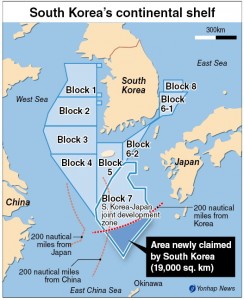2012-07-11 The East China Sea has been contested for decades by South Korea, China and Japan, all seeking to tap huge oil, gas and mineral reserves believed be buried under the seabed.
With their extended continental shelves overlapping in the northeastern part of the ocean, the Asian powers are laying formal claims with a U.N. body in charge of sea shelf carve-up.
The three-way jousting recently took a twist. Seoul and Beijing are working on a joint submission to counter Tokyo’s increasingly aggressive push in maritime issues.
The unlikely alliance with China could mark a turnaround for Korea, which has lacked assertiveness against its powerful neighbors.
But experts say defending maritime interests is still an uphill battle for Korea, which is far behind in terms of scientific data, diplomatic prowess and domestic legislation.

With inland resources depleting at a brisk clip, a surging number of countries have turned to the ocean, which covers more than 70 percent of the planet’s surface.
More than 1.6 trillion barrels of crude, or about 32.5 percent of the world’s reserves, are thought to be buried under the ocean floor, according to Samsung Economic Research Institute.
Driven by their ever-growing thirst for energy, the three Asian powers are excavating seabed minerals at home or abroad, cultivating the latest exploration and extraction technologies and stocking up on related equipment.
“The skyrocketing resources consumption across the region and stiffening competition in the international commodity market have prompted Korea, China and Japan to reinforce strategies to develop wells in their waters. This trend interlocks with the sea shelf boundary issue, generating a conflict factor,” Lee Dal-seok, head of energy policy research at the state-run Korea Energy Economics Institute
“Any potential discord Korea may face while pursuing submarine oilfields originates from intense competition for energy in East Asia,” Lee said.
The East China Sea has become a flashpoint chiefly due to its treasure trove of crude oil and natural gas that came to light after a U.N. survey in 1968. ….
Armed with its growing financial firepower, China is also rushing to access untapped reserves across the globe. Its state-run enterprises such as Sinopec, CNOOC and PetroChina are rapidly biting into a market long occupied by global giants such as Exxon Mobil, BHP Billiton, Chevron and Petrobras.
Beijing has recently developed a manned submersible capable of operating up to 6 kilometers below the surface. It aims to secure more than 15 ultramodern deepwater exploration vehicles by 2020 and mobilize at least three vessels of 4,000 tons or heavier…..
By Shin Hyon-hee ([email protected])
Song Sang-ho contributed to this report. ―
The Korea Herald
To read the complete article see
http://view.koreaherald.com/kh/view.php?ud=20120710001337
For an analytical look at the maritime disputes discussed see Strategic Insights No. 39
https://www.sldinfo.com/products/april-2012-si/


